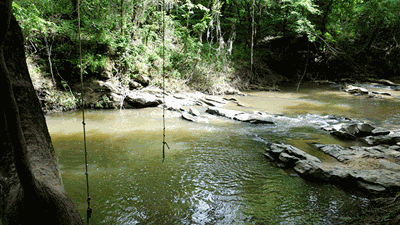Wetumpka’s Corn Creek is renovated and open to the public
There’s a hidden secret in Wetumpka with crystal clear waters, small rapids, a waterfall and lots of shoreline for fishing.
Corn Creek Park has officially been re-opened for nearly a year now, and the improvements allow easier and safer access to everything the area has to offer.
The park was first established as a recreational spot for kayakers, anglers, picnic goers and families nearly 20 years ago, but not without a struggle. The original members of the Coosa River Paddling Club (CRPC) saw an open niche to be filled and fought the proposal to clear-cut the land for timber sales. At the time, there was no public park, and locals had used Corn Creek for years in its natural condition.
“It was not worth the money they would make on timber compared to the aesthetics of the area,” said Lonnie Carden, owner of Coosa Outdoor Center.
The county owned the property, so CRPC members began attending county commission meetings for nearly six years to present their case that Corn Creek was worth salvaging. According to Chris Carter, owner of Coosa River Adventures, a lot of accolades go to county commissioner at the time, Don Horton. His children grew up on Corn Creek, and they had used that property for years, so his sway in favor of keeping the land in tact helped with public opinion.
Eventually, the county agreed to lease the land to the club for a nominal fee, but the investment made by the CRPC to clean up the area, build a road and make it usable for the public approached $100,000.
“The club accepted the role to maintain the park, and we’re not asking for accolades. We do want to use the educational position that water and rivers like ours are precious resources and should be shared publically,” said Carter.
Most of the money was spent on rock to make a drivable road, which previously was impossible to access without 4-wheel drive. Also, they didn’t have to cut down many trees, said Carden, which helped maintain the natural aesthetic balance.
There was a local police officer that would open the gate every morning at sunrise and another to close the gate at sunset, so the area was secured and protected.
“I went up there one time, and the cop was still sitting there, eating his breakfast. Turns out there were a few river otters he liked to watch play in the water every morning, and you don’t see many of those around here,” said Carden.
The Coosa Whitewater Festival became the funding mechanism for this project, and without its sponsors, donations and participants, Corn Creek Park would have never been made possible, he explained.
Since its inception, the event was highly attended since the whitewater craze had just skyrocketed, according to Carter. What also helped is that a lot of people registered for the event with no intention of competing, but simply as a way to give back, he added.
“It was paddling club member David Haynes, who was passionate about the river, that organized the club to really get involved and made sure funds could be secured to create a public park at no expense to the taxpayer,” said Carter.
Quickly enough, the area was used by all ages; fishermen returned to the area; it became an alternative take-out for kayakers on the river; and at least 20-25 people could be found there hanging out almost all the time, said Matt Thornton, member of CRPC.
“It’s the only dog park in the county; there is over a mile of walking trails; Eagle Scouts use the area to receive nature badges; and it’s a unique area that’s the perfect location for fly fishermen,” said Carter.
Even with the paddling club voluntarily maintaining the area, a few bad incidences, an overflow of trash left by park goers and miscommunication between the CRPC and the city led to a rocky reputation for Corn Creek.
However, the main issue was the location of the access road that had been built. It was close to the county jail, and the sheriff’s office was nervous about there being too much accessibility of inmates to receive contraband; therefore, the road was closed, allowing no other way into the park, for nearly three years.
Through due diligence of the club and Carter’s knowledge of property boundaries, members met with the county engineer to discuss alternative routes into the park.
“The entire staff saw the vision, and through their vision and their gratitude, they offered to do the work gratis for the new road if we could come up with funding for the materials,” said Carter.
The CRPC was told the total cost would be $60,000 to build a new road, and the club raised $15,000 from its annual whitewater festivals. The city then agreed to match another $15,000. The county put the remaining $30,000 in-kind into the project, said Carden.
Before re-opening, the club also cut out bad trees, re-cleaned it up and took away the trash cans, so people wouldn’t be tempted to leave their trash behind. Club members created warning signs, repaired picnic tables and grills, built a changing room and cut back the natural growth to create usable trails.
“The drive into the park is now more aesthetic and family-car friendly. We wanted to do something good for the community,” said Carden.
The number of people that used the park previously has greatly diminished, and the majority of people out there now belong to the CRCP.
“It’s still kind of a hidden secret, which is fine. But we want people to know it’s there and to use it again. We don’t want it to revert back to the way it was, but it is free and open to the public,” said Thornton.


